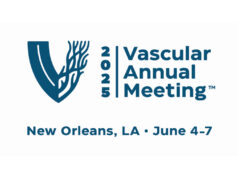Each year, one of the highlights of the Vascular Annual Meeting is the lively Crawford Critical Issues Symposium, headed this year by Dr. Bruce Perler of Johns Hopkins Hospital Division of Vascular Surgery. His topic, “How You Can Succeed Under the Affordable Care Act,” will be addressed by stakeholders from all sides of the issue.
Speakers will be –
• Dr. Stephen Ondra,senior vice president and CMO of Health Care Service Corporation, offering the viewpoint of the insurance industry
• Larry Boress, president and CEO, Midwest Business Group on Health, an agency that helps employers choose and manage health care benefits for employees
• Dr. Bruce Landon, professor of health care policy, Harvard Medical School, discussing how ACA may impact vascular surgeons
• Dr. Dan Clair, chair, Department of Vascular Surgery, the Cleveland Clinic, discussing how vascular surgeons can succeed as hospital employees
Vascular Specialist asked Dr. Perler to tell us more about this event, scheduled for 10:30 a.m. to noon on Thursday, June 18.
VS:Why did you pick this topic? Dr. Perler: There is no more important and overarching issue for all vascular surgeons today than the rapidly changing contemporary health care environment related to the Affordable Care Act. Quite honestly, for a number of reasons and in large part due to these changes, I believe the lines of demarcation between private and academic practice are increasingly blurring. The pressures, external threats, and challenges to achieving a satisfying and economically viable practice are quite similar today irrespective of practice type or location.
The increasing movement to full-time hospital employment, the increasing emphasis on quality outcomes, impending changes in reimbursement models, and the emergence of Accountable Care Organizations (ACOs) are factors affecting the practices of all vascular surgeons. I therefore believed that this was a most appropriate topic to address at the 2015 Crawford Critical Issues Symposium. “How You Can Succeed Under the Affordable Care Act” will provide strategies that our members can follow to not only survive but thrive in this new health care order.
VS: What takeaways do you hope attendees will have at the end of the session? Dr. Perler: We will be bringing together in one forum a world class group of nationally recognized experts and stakeholders in health care to share their knowledge about, and expectations for, the immediate and mid-term future of health care economics. The panel includes individuals with diverse backgrounds and interests including the perspectives of the employer, the payor, public health policy-makers, and the practicing institution-employed vascular surgeon. We believe these presentations and the opportunity for our attendees to engage these leaders in a question-and-answer session will provide education about the expectations these stakeholders have of clinicians and therefore allow our members to develop strategies that they might incorporate in their own practices to continue professionally satisfying and economically productive practices.
While all medical practitioners are affected by these changes inherent in the Affordable Care Act, because of our relatively small numbers and the increasing multispecialty completion that vascular surgeons face, including for many participation in multispecialty cardiovascular centers as well as increasing hospital employment, I believe that these issues are particularly relevant to our specialty.
VS: You have an interesting line-up of panelists, what were your reasons for selecting each?Dr. Perler: There are clearly multiple stakeholders or components in our health care system with unique backgrounds, interests, and agendas. Each of them will bring to the Crawford Symposium a perspective from his specific component of the system, the insurer, the employer, the hospital-employed surgeon, and someone with specific expertise in Accountable Care Organizations and knowledge of vascular surgical practice.
It was my expectation to bring these experts together in one setting to not only provide useful information for our attendees, but to allow them to engage in a collective discourse that should provide an unparalleled educational experience for our attendees.
VS: Where do you think their biggest areas of agreement, and of disagreement, will be during the discussion?
Dr. Perler: That’s a great question and the short answer is I can’t precisely predict. In general, I would assume that there will be a consensus that rising health care costs must come under control and physician reimbursement in the future will be increasingly linked to quality outcomes rather than pure case volume. There also may be a consensus on the importance of longitudinal patient care.
Beyond the obvious, however, the key question is whether or how the health care system will align reimbursement to the distinctive competencies of vascular surgeons as the only truly comprehensive vascular specialists who provide the totality of care including diagnosis as well as medical, surgical, and endovascular therapy. Will employers and insurers recognize the value of the comprehensive care that only vascular surgeons provide? Will ACOs factor that competency into specialty referral patterns? Further, will payors and hospitals recognize the unique leadership that vascular surgeons can provide in the care of cardiovascular patients in the hospital environment?













